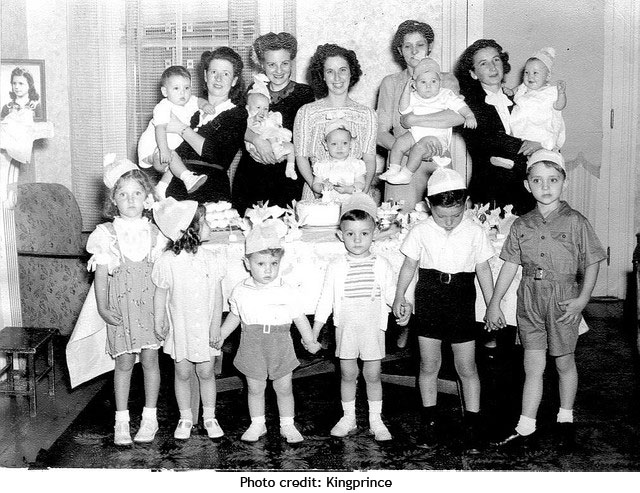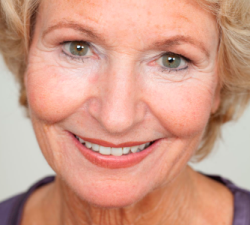Mother Nature’s Emissaries

Jane is walking down the street, lost in her thoughts, when suddenly she hears someone cry out. Turning toward the sound, she sees that an elderly man has fallen on the road. She runs toward him and finds that he needs help. It so happens that Jane is a physician, and her medical training comes to the fore as she takes his pulse and checks his breathing. The ability to doctor was within Jane, but it was not in the forefront of her personality until the incident called it out. In the same way, every woman on Mother Earth—whether she’s sitting at a desk, sprinting along a track, piloting a plane, or whatever she is doing at the time—has the innate tendency to mother, to nurture and to express compassion whenever her environment expresses the need.
As a mother and psychologist, I was fascinated and touched to read a news story a few weeks ago with the headline Jewish Nurse Steps in to Feed Palestinian Baby After His Parents Are in a Car Accident. The article reports:
The mother, who sustained a major injury in a car accident, and her baby, Yaman, were brought to the pediatric emergency room at Hadassah Ein Kerem Hospital in Jerusalem for treatment. With the mother unable to breastfeed her baby boy, his aunts tried to bottle feed him, but Yaman, who only sustained minor injuries, refused to eat for seven hours and continued to cry.
The aunts approached a Jewish pediatric nurse, Ula Ostrowski-Zak, and asked for help. Ostrowski-Zak, who is a breastfeeding mom herself, immediately volunteered to nurse the baby. “They asked me if I could help them find someone who would breastfeed the baby,” Ostrowski-Zak told the news outlet. “As a nursing mother, I didn’t hesitate and suggested that I do it myself.” She nursed the nine-month old five times. She said, “His aunts were surprised that a Jew agreed to breastfeed him, but I told them that every mother would do it.”
Then Ula Ostrowski-Zak posted to her local La Leche League, a closed Facebook group of nursing mothers, and received more than a thousand responses from women who volunteered to travel from Haifa to breastfeed the baby boy while his mother was hospitalized.
This outpouring of support from women more than willing to cross a political and ethnic divide shows a foundational communion among women everywhere. It displays a tender impulse that is so powerful within women that it transcends boundaries we may have in our everyday lives.
I remember, when I was a new mother, how surprised I was at the intense protective feelings that simply arose from within and the enormous expanding of my heart and the limitless love that poured out. It was incredible. And not only did I experience those feelings, I felt them for other children and mothers as well. It was as if we were all in this motherhood archetypal role together.
Women tend to nurture—the tendency is built in to our minds, bodies and emotions. In families, women are, by far, the dominant percentage of caregivers, assuming much, or all, of the responsibility for children and for ill, disabled, and elderly relatives. Women also are the majority percentage in nurturing professions like home health aides (89% are women), social workers (84.8% are women), child care (94%), grade school and middle school teachers (75.4%), veterinarians (80.7%), flight attendants (80%), midwives (99%), family medicine practitioners (60%), pediatricians (75%), and nurses (90%).
I remember a friend recounting a story of a visit to her hospitalized father after surgery. Four male physicians and a nurse greeted her, and each physician introduced their specialty, as in “I’m the surgeon,” “I’m the anesthesiologist,” “I’m the radiologist,” and “I’m the cardiologist.” She smilingly asked them, “But who takes care of the “whole patient?” The nurse piped up, “The nurses!” It’s what we do—we’re hardwired.
Fine-Tuning Our Hardwiring
We’d like to think we’ll be able to ignore our needs while taking care of others. However, reports of caregivers’ exhaustion, stress and compassion fatigue both in the home and in careers continue to increase. People are sensitive to their caregiver’s stress and reportedly receive worse quality of care when the caregiver is overworked, tired, anxious or depressed. So having an effortless, restful way for the caregiver to re-energize, re-group and calm down is essential. The Transcendental Meditation technique fits nicely into this niche: it is easy to learn and effortless to practice, and it’s a powerfully effective stress buster. Research has found that the TM practice produces a state of profound relaxation, much deeper than ordinary rest which is accompanied by increased alertness and orderly brain function. Regular practice results in decreased anxiety, fatigue, depression, insomnia and hypertension along with improved focus, self-esteem, creativity and happiness. And this is exactly why children often remind their mothers that it’s “time to do TM.”
Nourishing Oneself
Intuition, patience, wisdom, love—all the blessed qualities associated with motherhood and caregiving—often are obliterated when we are exhausted and not aligned with our own internal voice and source of nourishment. During the TM practice, our mind effortlessly settles to quieter, softer levels of thinking, transcending the pressures, worries and agitation of our active mind. This easily accessed experience of inner silence restores our energy, happiness, and ability to extend our selves to others in a relaxed, compassionate, vibrant way.
We are the woman we want to be. We are the kind of mother, caretaker, sister and friend we want to be. We are available to each other in Nature’s own sisterhood. We are sustained by the silent fullness within us when we meditate regularly. And when moments—or longer periods—arise in which we feel that we fall short of who we can be, the TM practice will bring us deep into our self and we’ll be replenished.
About the Author
Susan Linden is a mom and a certified teacher of the TM technique with 17 years of experience as a certified school psychologist.





